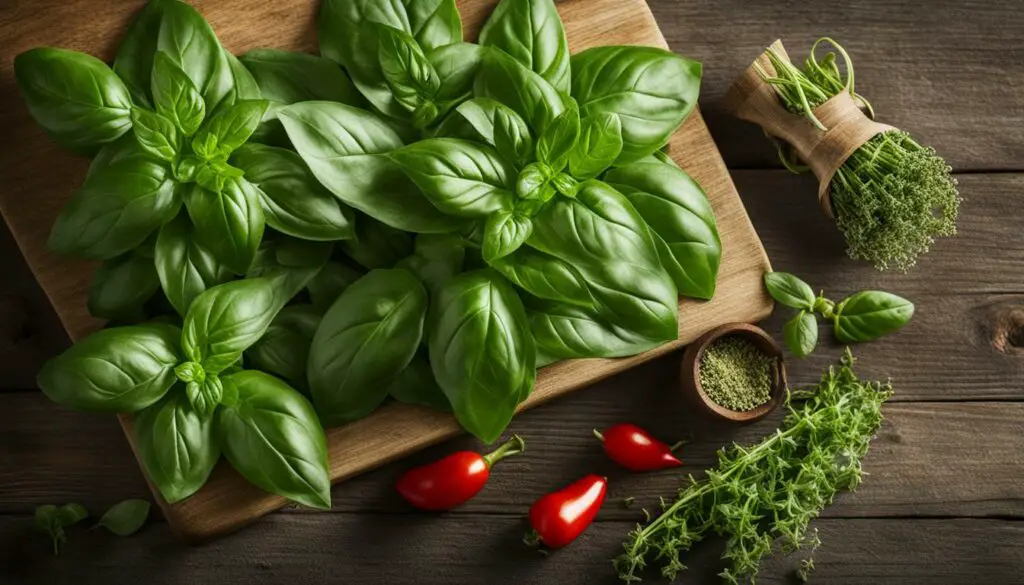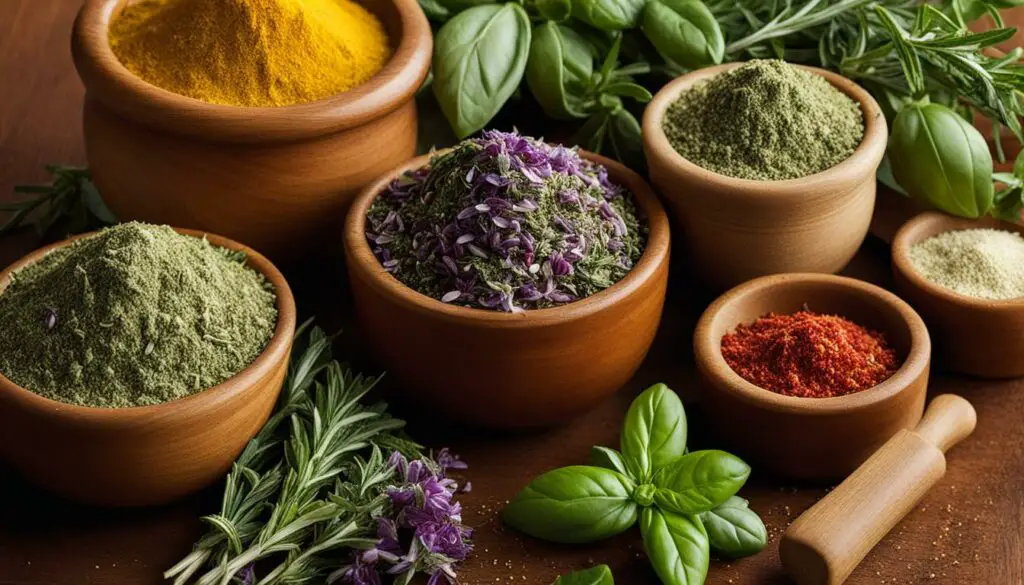If you’re in need of a substitute for Italian seasoning, we’ve got you covered. Whether you’re missing a few ingredients or simply want to try something new, there are several options available that can provide a similar flavor profile to enhance your dishes. Let’s explore some of the best Italian spice substitutes that you can easily use in your recipes.
Table of Contents
Key Takeaways:
- When it comes to substituting Italian seasoning, options include homemade Italian seasoning, basil and oregano, Herbes de Provence, creole seasoning, and Greek seasoning.
- Experiment with different spice combinations to find the substitute that best suits your taste preferences and the specific dish you’re preparing.
- Consider using fresh herbs, adjusting the quantity as they have a more subtle flavor compared to dried herbs.
- Be cautious when substituting spices, starting with half the amount specified in the recipe, and adjusting to taste.
- Store your spices in a cool, dry place to maintain optimal flavor.
Homemade Italian Seasoning

If you find yourself in need of a substitute for Italian seasoning, making your own homemade blend is a fantastic option. By creating your own Italian seasoning, you have full control over the flavors and can customize it to suit your taste preferences. The key ingredients for homemade Italian seasoning are dried oregano, basil, thyme, sage, and rosemary. These aromatic herbs come together to create a well-balanced and flavorful spice mix.
To make homemade Italian seasoning, simply mix the dried herbs together in the desired proportions. You can experiment with different ratios to achieve the flavor profile that you enjoy the most. Some recipes may suggest adding salt to the blend, but this is entirely optional and depends on your preference for a salty seasoning.
Pro Tip: For a basic homemade Italian seasoning blend, try mixing equal parts of dried oregano, basil, thyme, sage, and rosemary. Adjust the quantities according to your taste preferences.
Once you have your homemade Italian seasoning ready, the possibilities are endless. This versatile blend can be used in a wide range of recipes to impart an authentic Italian flavor. Sprinkle it on homemade pizzas, season pasta sauces, or use it to enhance the taste of marinades for meats and vegetables. The fragrant herbs will bring a burst of flavor to your dishes and elevate them to a whole new level.
With homemade Italian seasoning, you can enjoy the vibrant flavors of Italy in your own kitchen. Create your own signature blend and elevate your culinary creations with this aromatic spice mix.
Basil and Oregano

If you don’t have all the ingredients for Italian seasoning, using basil and oregano can be a simple and effective substitute. These two herbs provide a combination of sweet and savory flavors that are commonly found in Italian cuisine. When using basil and oregano as a substitute, you can mix them in equal proportions. Fresh herbs can also be used, but remember to adjust the quantity as they have a more subtle flavor compared to dried herbs.
Herbes de Provence

In search of Italian seasoning alternatives? Look no further than Herbes de Provence, a delightful seasoning blend hailing from the Provence region of France. This aromatic mix typically includes a combination of rosemary, oregano, thyme, savory, and marjoram. Some varieties even incorporate the fragrant essence of lavender flowers. While Herbes de Provence may offer a slightly different flavor profile than traditional Italian seasoning, it still makes an excellent substitute. Its versatile nature allows it to be used for marinating meat, fish, and vegetables, as well as in salad dressings.
Not only does Herbes de Provence add depth and complexity to your dishes, but it also imparts a touch of French elegance. Whether you’re looking to elevate a classic Italian recipe or simply explore new flavors, this seasoning blend is sure to delight your taste buds.
Creole Seasoning

Creole seasoning is a flavorful blend of herbs and spices commonly used in Louisiana cuisine. It combines ingredients such as basil, oregano, black and white pepper, paprika, onion powder, garlic powder, and cayenne pepper. While creole seasoning may have a distinct taste compared to Italian seasoning, it can still be a great substitute, especially for spicy dishes.
Creole seasoning adds a punch of flavor to any recipe and can be adjusted to suit your desired level of spiciness. If you prefer a milder taste, use less creole seasoning, and if you like it hot, add more. Its versatile nature allows you to use it in various dishes, from seafood gumbo to jambalaya.
Greek Seasoning

Greek seasoning may not be the most obvious choice as a substitute for Italian seasoning, but it can still provide a delicious flavor. Common ingredients in Greek seasoning include oregano, basil, parsley, dill, garlic, onion powder, and pepper. Some varieties may also contain rosemary and thyme, which are commonly found in Italian seasoning. Greek seasoning can be used in a 1:1 ratio as a substitute for Italian seasoning in various dishes, such as meat, chicken, and vegetables.
Comparison Table: Greek Seasoning vs. Italian Seasoning
| Greek Seasoning | Italian Seasoning |
|---|---|
| Oregano | Oregano |
| Basil | Basil |
| Parsley | Thyme |
| Dill | Sage |
| Garlic | Garlic |
| Onion Powder | Onion Powder |
| Pepper | Rosemary (optional) |
| Rosemary (optional) | Thyme (optional) |
Using Fresh Herbs

While dried herbs are commonly used in Italian seasoning, fresh herbs can also be a great substitute. When using fresh herbs, keep in mind that you’ll need to use about 1.5 times the amount of fresh herbs compared to dried herbs to achieve the same flavor. It is also recommended to add fresh herbs towards the end of cooking to preserve their flavor. Fresh herbs can add a vibrant and aromatic touch to your dishes and are particularly suitable for garnishing.
When substituting dried herbs with fresh herbs, it’s important to consider the taste and aroma of the herbs. The flavor of fresh herbs is often more pronounced compared to their dried counterparts, so you may need to adjust the quantity based on your personal preference.
Here are some popular fresh herbs that can be used as a substitute for Italian seasoning:
- Basil: Known for its sweet and slightly minty flavor, basil adds a burst of freshness to Italian dishes. It pairs well with tomatoes, pasta, and cheese.
- Oregano: With its robust and earthy flavor, oregano is a staple herb in Italian cuisine. It complements pizza, pasta sauces, and marinades.
- Parsley: Offering a mild and slightly peppery taste, parsley is often used as a garnish. It can also enhance the flavor of soups, salads, and roasted vegetables.
- Rosemary: Known for its aromatic and pine-like flavor, rosemary adds depth to Italian dishes. It pairs well with roasted meats, potatoes, and bread.
- Thyme: With its subtle and earthy flavor, thyme is a versatile herb in Italian cooking. It complements tomato-based sauces, roasted vegetables, and grilled meats.
Experiment with different combinations of fresh herbs to create your own unique Italian seasoning blend. Don’t be afraid to get creative and adjust the proportions based on your taste preferences.
| Herb | Flavor Profile | Best Pairings |
|---|---|---|
| Basil | Sweet and Minty | Tomatoes, pasta, cheese |
| Oregano | Robust and Earthy | Pizza, pasta sauce, marinades |
| Parsley | Mild and Peppery | Soups, salads, roasted vegetables |
| Rosemary | Aromatic and Pine-like | Roasted meats, potatoes, bread |
| Thyme | Subtle and Earthy | Tomato-based sauces, roasted vegetables, grilled meats |
Using fresh herbs not only adds flavor to your dishes but also brings a visual appeal with their vibrant green color. Whether you’re substituting dried herbs or simply want to enhance the taste of your Italian recipes, fresh herbs can be a delightful addition.
Other Spice Substitutes

In addition to the aforementioned substitutes, there are other spice options that can be used as alternatives to Italian seasoning. For those looking to replace Italian seasoning, individual spices such as oregano, basil, thyme, sage, and rosemary can be used separately or in combination to achieve a similar flavor profile. These spices are commonly found in Italian cuisine and can add depth and aroma to your dishes. Experiment with different ratios to find the perfect blend for your taste.
If you’re looking to infuse your recipes with a unique twist, consider using premixed spice blends like Cajun seasoning or curry powder as alternatives to Italian seasoning. These spice blends offer a wide range of flavors and can add a delightful kick to your dishes. Whether you prefer a spicy Cajun flavor or the aromatic notes of curry, these alternatives can bring new life to your Italian-inspired recipes.
Here’s a table summarizing some spice substitutes for Italian seasoning:
| Spice | Flavor Profile | Usage |
|---|---|---|
| Oregano | Herbaceous, slightly bitter | Commonly used in Italian dishes, pizza, and pasta sauces |
| Basil | Sweet, slightly peppery | Perfect for pasta sauces, pesto, and Caprese salad |
| Thyme | Savory, earthy | Ideal for roasted vegetables, soups, and stews |
| Sage | Warm, slightly minty | Great for stuffing, roasted meats, and butter sauces |
| Rosemary | Piney, citrusy | Enhances the flavor of roasted potatoes, grilled meats, and bread |
Remember, the key to finding the perfect substitute for Italian seasoning is to experiment and trust your taste buds. Don’t be afraid to get creative in the kitchen and discover new flavor combinations that suit your preferences. Whether you choose to stick with traditional Italian herbs or venture into bolder spice blends, the possibilities are endless.
Tips for Substituting Spices
When it comes to substituting spices in your recipes, it’s important to consider the following tips to ensure the best results:
- Start with half the amount: When substituting spices, it’s a good idea to start with half the amount specified in the recipe and adjust to taste. This allows you to control the intensity of flavors and prevents overpowering the dish with the substitute spice.
- Be cautious with strong-flavored spices: Some spices have a stronger flavor compared to others. When using a substitute spice, such as a more potent herb or spice, it’s crucial to exercise caution and add it gradually to avoid overwhelming the recipe.
- Consider the overall flavor balance: If a recipe calls for multiple spices, it’s essential to consider the overall flavor balance when substituting. Take into account the taste profiles of the spices used and adjust the quantities accordingly to maintain a harmonious blend of flavors.
- Be mindful of allergies and restrictions: When selecting spice substitutes, it’s important to be aware of any potential allergies or dietary restrictions. Some individuals may have allergies to certain spices, while others may follow specific dietary guidelines. Ensure that the substitute spice aligns with these considerations.
- Label and store spices correctly: To preserve the freshness and flavor of your spice substitutes, it’s essential to label and date them properly. Store spices in a cool, dry place away from direct sunlight to maintain their optimal flavor and potency.
Incorporating these tips into your spice substitution process will help you create delicious and well-balanced dishes, even when using alternative spices. Experimentation is key, so don’t be afraid to try different combinations and adjust according to your preferences. Enjoy the journey of exploring new flavors in your recipes!
The Versatility of Poultry Seasoning
Poultry seasoning is a popular blend of spices commonly used in dishes featuring chicken, turkey, and other poultry. However, its flavors can also add a delightful touch to vegetarian and vegan meals. Luckily, there are several alternatives to poultry seasoning that can provide a similar taste profile. One such substitute is homemade Italian seasoning, which can be used interchangeably with poultry seasoning. By selecting spices and herbs that complement your desired flavor profile, you can experiment with different blends to find the one that best suits your taste preferences.
The beauty of poultry seasoning lies in its versatility. While it is traditionally used in poultry dishes, its combination of herbs and spices can bring depth and richness to a variety of meals. By exploring alternative options, such as homemade Italian seasoning, you can expand your culinary repertoire and create flavor-packed dishes that capture the essence of poultry seasoning. Whether you’re a meat eater or follow a plant-based diet, these substitutes offer a delicious alternative to poultry seasoning.
Poultry Seasoning Substitutes
| Substitute | Flavor Profile | Usage |
|---|---|---|
| Homemade Italian Seasoning | Herbaceous with a hint of warmth | Perfect for roasted vegetables, soups, and marinades |
| Basil and Oregano | Sweet and savory combination | Ideal for pasta sauces, pizzas, and dressings |
| Herbes de Provence | Aromatic and earthy | Enhances the flavor of roasted meats and vegetables |
| Creole Seasoning | Spicy and bold | Perfect for Cajun-inspired dishes |
| Greek Seasoning | Fragrant and zesty | Complements Mediterranean-inspired dishes |
Each of these substitutes offers its own unique combination of flavors. Whether you’re looking to add a touch of warmth, a burst of fragrance, or a spicy kick to your dishes, these alternatives to poultry seasoning have got you covered. Don’t be afraid to get creative in the kitchen and experiment with different spice blends to find the perfect substitute for your favorite poultry seasoning recipes.
Conclusion
In conclusion, when it comes to finding a substitute for Italian seasoning or poultry seasoning, there are numerous options available to suit your taste preferences and culinary needs. Whether you prefer to make your own homemade Italian seasoning or opt for pre-mixed spice blends such as basil and oregano, Herbes de Provence, creole seasoning, or Greek seasoning, you can easily achieve a similar flavor profile in your dishes. The key is to experiment and adjust the quantities of herbs and spices to find the perfect combination for the specific recipe you’re preparing.
By exploring these versatile spice substitutes, you can add depth and richness to your favorite Italian-inspired recipes or experiment with new flavor profiles. Whether you’re making pizza, pasta, marinades, or other Italian dishes, these substitutes can elevate your culinary creations. Don’t be afraid to mix and match different herbs and spices to create a unique blend that suits your personal taste.
So, the next time you find yourself without Italian seasoning or poultry seasoning, remember there’s no need to panic. With the wide range of alternatives available, you can still achieve the flavors you desire. Whether you choose to make your own seasoning blend or utilize a premixed option, the world of flavor is at your fingertips. Get creative in the kitchen and uncover new taste sensations with these convenient and delicious Italian spice substitutes.
FAQ
What are some substitute options for Italian seasoning?
Some popular substitute options for Italian seasoning include homemade Italian seasoning, basil and oregano, Herbes de Provence, creole seasoning, and Greek seasoning.
How can I make homemade Italian seasoning?
To make homemade Italian seasoning, you can mix dried oregano, basil, thyme, sage, and rosemary together according to your taste preferences. Adding salt is optional. You can use this seasoning in various recipes.
Can I use basil and oregano as a substitute for Italian seasoning?
Yes, basil and oregano can be used as a simple and effective substitute for Italian seasoning. You can mix them in equal proportions to achieve a similar flavor profile.
What is Herbes de Provence and can it be used as a substitute for Italian seasoning?
Herbes de Provence is a seasoning blend that originates from the Provence region of France. It typically includes herbs such as rosemary, oregano, thyme, savory, and marjoram. While it may have a slightly different flavor profile compared to Italian seasoning, it can serve as a suitable substitute in various dishes.
Can creole seasoning be used as a substitute for Italian seasoning?
Yes, creole seasoning can be a great substitute for Italian seasoning, especially for spicy dishes. Creole seasoning is a flavorful blend of herbs and spices commonly used in Louisiana cuisine. It includes ingredients such as basil, oregano, black and white pepper, paprika, onion powder, garlic powder, and cayenne pepper.
Is Greek seasoning a suitable substitute for Italian seasoning?
While not the most obvious choice, Greek seasoning can still provide a delicious flavor as a substitute for Italian seasoning. Common ingredients in Greek seasoning include oregano, basil, parsley, dill, garlic, onion powder, and pepper. Some varieties may also contain rosemary and thyme, which are commonly found in Italian seasoning.
Can I use fresh herbs as a substitute for Italian seasoning?
Yes, fresh herbs can be a great substitute for Italian seasoning. Keep in mind that you’ll need to use about 1.5 times the amount of fresh herbs compared to dried herbs to achieve the same flavor. It is also recommended to add fresh herbs towards the end of cooking to preserve their flavor.
What other spice options can I use as alternatives to Italian seasoning?
In addition to the aforementioned substitutes, you can try using individual spices such as oregano, basil, thyme, sage, and rosemary separately or in combination to achieve a similar flavor profile. Some premixed spice blends like Cajun seasoning or curry powder may also provide a unique twist to your recipes.
How do I substitute spices in recipes?
When substituting spices, it is recommended to start with half the amount specified in the recipe and adjust to taste. Some spices may have a stronger flavor compared to others, so it’s important to be cautious when adding them. Consider the overall flavor balance and adjust accordingly.
Can I use poultry seasoning as a substitute for Italian seasoning?
Yes, poultry seasoning can be used as a substitute for Italian seasoning, especially in poultry dishes. However, it is important to select spices and herbs that complement your desired flavor profile. Experiment with different blends to find the one that best suits your taste preferences.
Source Links
- https://www.foodchamps.org/excellent-italian-seasoning-substitute/
- https://www.bhg.com/recipes/how-to/cooking-basics/spice-substitute/
- https://cookingchew.com/poultry-seasoning-substitute.html
See also:

Leave a Reply